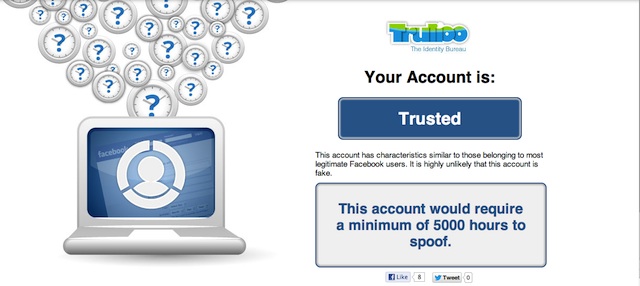Identity verification startup Trulioo is launching its first product today — Profile Plus, a service that analyzes Facebook profiles and determines whether they’re likely to be spoof accounts.
The company has had a busy few months, and in conjunction with the Profile Plus launch, it’s also announcing that it has raised $2 million in seed funding from Blumberg Capital and hired Andrew Nash as its CTO. Nash’s most recent job was as the director of Internet identity products at Google, and he first joined Trulioo as an advisor before coming on full-time in August.
Co-founder and CEO Stephen Ufford told me that Trulioo started in 2009 as a background-check service for dating sites, but it has evolved into something much more ambitious. To use the company’s tagline, it aims to be “the identity bureau” of the Internet. Ufford has a background in this area, having founded three other credit and identity startups in the past decade, and also worked for Canada’s credit bureau.
For the most part, online identity verification services currently use some form of knowledge-based authentication — at its most basic level, that means the “what was the name of your first pet?” questions that you’ve probably had to answer once in a while. (There are, of course, more sophisticated variations on the concept.). The problem, Ufford said, is that knowledge-based authentication is “high friction” and has major issues with data coverage.
He argued that Trulioo will offer a different approach, “trying to get a better understanding of who you are at a lower cost.” With Profile Plus, for example, the company isn’t determining whether you really are who you say you are, but instead whether you’re a “wet carbon lifeform” instead of a machine. More specifically, when a business signs up for Profile Plus, Trulioo looks at all of the accounts that have connected through Facebook Connect, and it estimates the likelihood that those accounts belong to real people. After all, businesses probably don’t want to waste time and money on marketing and outreach to fake accounts.
You can test out the Profile Plus algorithm for yourself here. After analyzing my Facebook account, Profile Plus said that I’m probably a real person — much to my relief — and estimated that it would have at least 5,000 hours to “spoof” my account. (Unfortunately I don’t run any spoof accounts that I could test as a counterexample.)
Next, Ufford plans to launch a product called Social Verify, which will look at social data to assess whether the registration information that a user provides is likely to be correct. As the company releases more products, Ufford said he wants them to be completely transparent and optional for consumers — you don’t have to share any information you don’t want to, but it might be worth it, because you can benefit when companies and other people know that “you are a real person and not a machine.”

